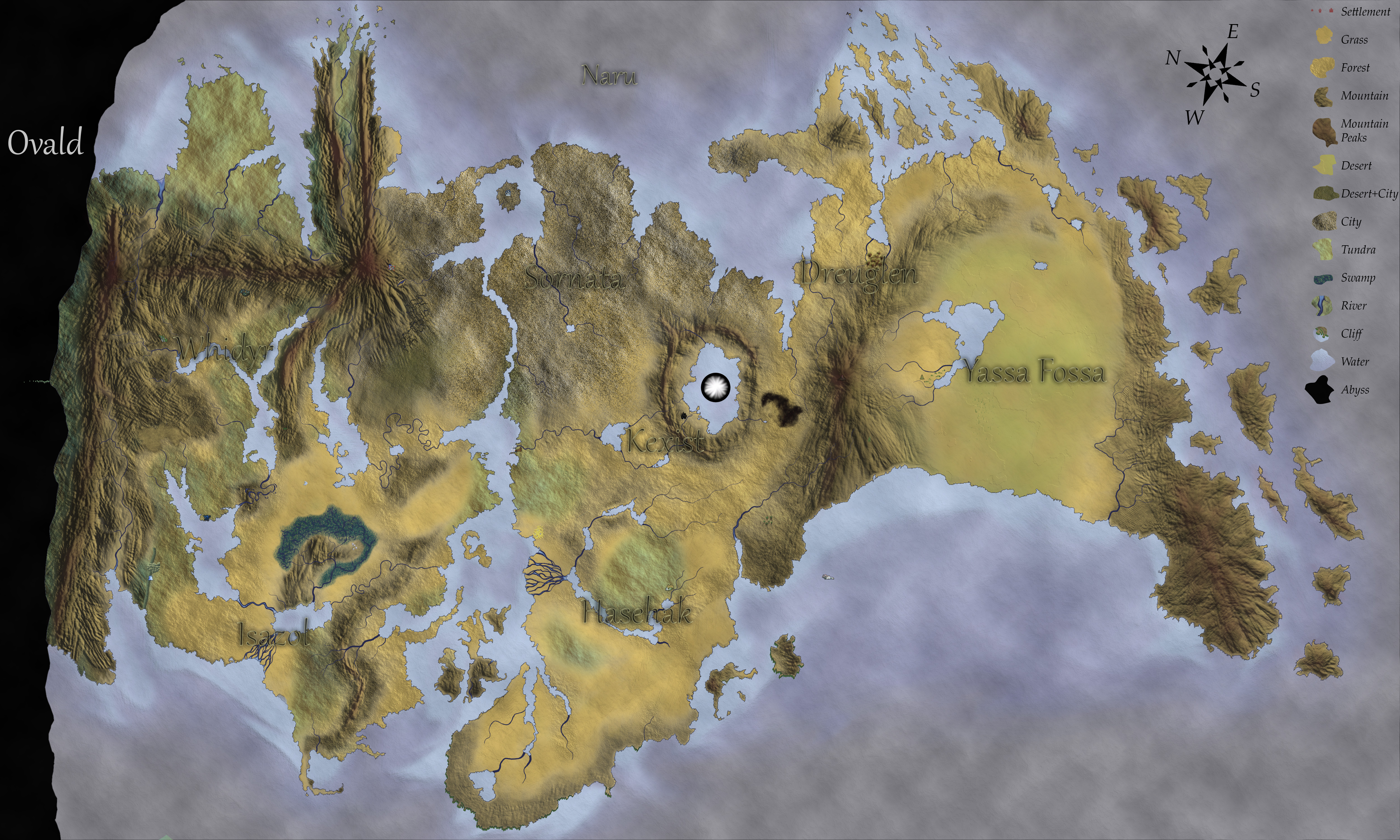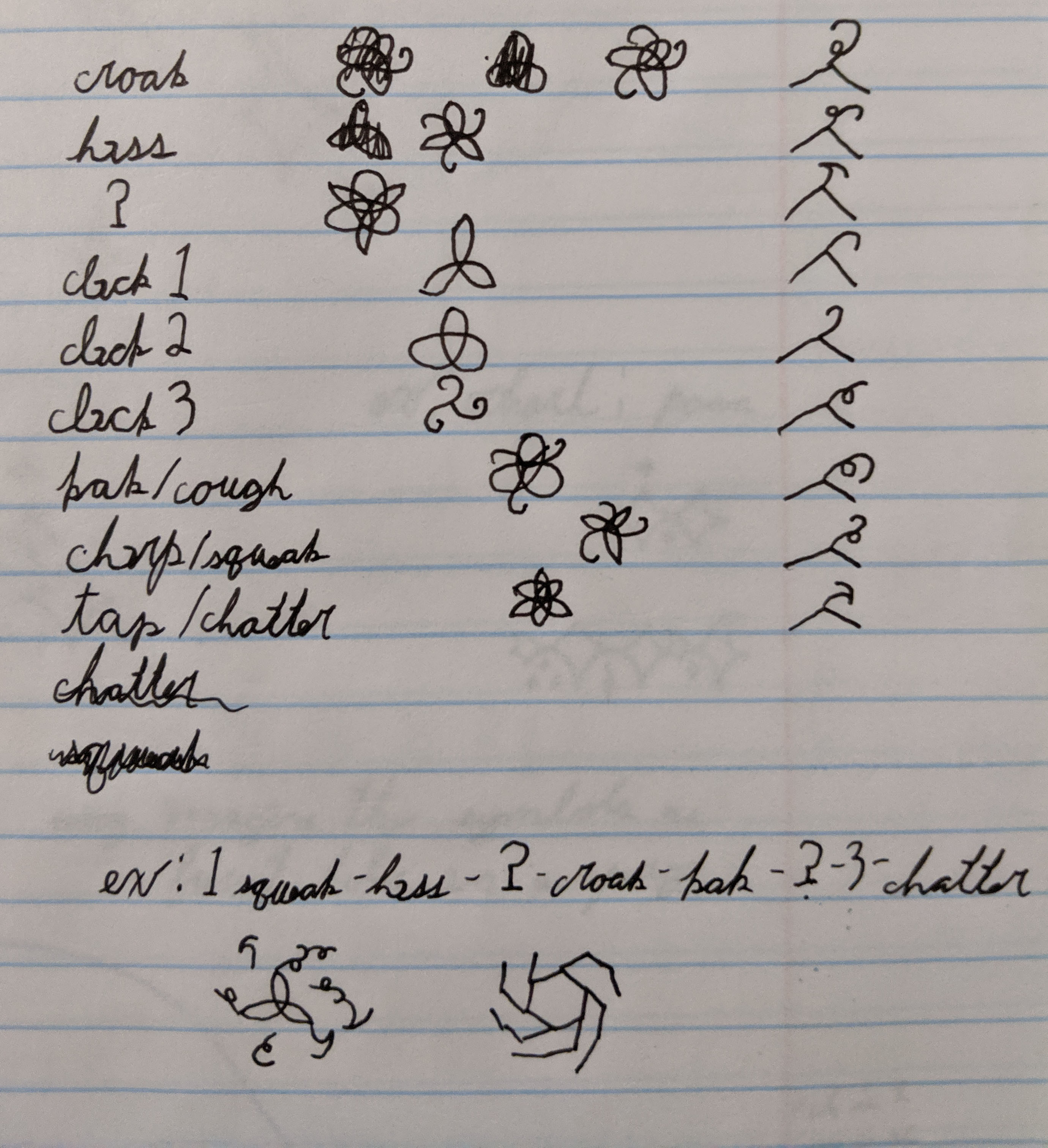Asi
Origin & Writing
Vshawen incorporated their written language (records lasting longer than a pheromone’s scent) into Asi. The written languages of several cultures vary along with their scent languages, it’s only the sounds of Asi that are uniform. The different languages correlate their own to Asi, to better communicate with outsiders while not losing their language and culture’s identity.The, frankly, gorgeous woven intricacies have been greatly simplified to accommodate the faster writing needed for the modern world, and for those who would have trouble writing their complexities. Most nests have at least one phoru dedicated to the practicing of what some may call, calligraphy, true writing, or wtwtsuododsucc (family’s written words). Even phor, drones, are to learn their colony’s written style, though it’s more for them to be able to read it than to write. And because of a phor’s lower intelligence, it’s typically the only language they will ever know, preventing them from communicating with the outside world. It’s up to the phoru, phori (king), and phora (queen) herself to conduct trades, political communication, cultural spread, and religious spread with words. And though the phora is always busy and never leaves her chambers, she can take control of one in her colony, even a phor, to communicate with someone. This is a great honor for those who are able to speak with the phora, even if by proxy.
It’s often the lower rank of the phori who are sent on exo-colony missions as the phora will not subject her favorites to danger. And it is these phori who are most well versed in speech, some even able to mimic the approximate sounds other species use to better communicate with them.
Alphabet
The language, as it’s meant to be sounded, was created first and foremost for Found, exo-colony vshawen. It was later that vshawen started trading more and having political relations with nations that are governed by other species that the language was adapted to cater to them as well. The phonetic alphabet has a gradient over the regions but has grown uniform in modernity’s spiral towards globalization.As stated before, vowels don’t technically exist in Asi, though they are put in by other species to attempt to pronounce the language. The vowels others use, such as ‘u’ in ‘su’ can be replaced with anything the speaker finds easiest (ex: sa), though ‘u’ is most common. What is within the brackets in the chart is the approximation sound for a mouth.
In most Vshawen colonies that use Asi, their writing system writes a sentence in a spiral. Scholars have a general consensus that it was the peoples of the area's heavy reliance on cycles. From the coming of the rains, the flooding of the rivers, the cycle of egg-laying and coccone incubation, cycles were all around the people.
Modern demands for speed and efficiency write like a drape, letters falling downward in a line. And to not have the language (which uses many sounds very quickly for a simple word) take up so much space: each sound made is written once with a marker nearby denoting how many times the sound is to be repeated.
Asi
| Fount (vshawen) | Ease (non-vshawen) | Morphed to Chkoht |
|---|---|---|
| Croak | [od] | |
| Hiss | [su] | Hiss/ Hack |
| Glottal | Glottal[g-] | Glottal |
| Click 1 (claws) | Snapping fingers [pt] | Tip teeth click |
| Click 2 (legs) | Side click [sk] | Side Click |
| Click 3 (Inner) | Clop Click [cc] | Clop Click |
| Kak (cough) | [ke] | |
| Chirp | Wistle T [wt] | |
| Knock/ Tap (hit exoskeleton) | [ja] | |
| Chatter | [pr] | Lip Implosion |
| Squeak | [ig] |
Phonology
Pronunciation
Asi can be hard for most to pronounce, but the source sounds are easily recognizable when articulated by the vshawen themselves. Vshawen can easily roll from one sound to another seamlessly. For those who have trouble doing this, a second spoken dialogue was introduced for Ease. These are not the exact sounds created, but are representative of the sounds.Many sounds are repeated a number of times before finding a new sound (Such as susususksk meaning sky water or rain). While this is easy and quick to produce for a vshawen, other species take much longer to say the same word (even with years of dedicated practice).
But what happens when a vshawen loses a part of their body they use to produce a sound, one may ask. When a phor loses a part of its body, it tries the best it can with what it has left to speak. For the most part, they’re out of luck if they are unable to speak the primary sounds. For phori and the phora, prosthetics for missing parts is common. However, it’s very easy for them to tell when a prosthetic is used during speech, creating a bit of disgust from the non-prosthetic user.
Grammar
Morphology
Importance
Asi is genderless. However, each word in the language has an importance. The importance for each word is learned as a young person grows up with the language. For those that learn Asi in their later years, they may grow frustrated with how arbitrary the importances of words may appear. This is off-putting for many foreigners, leading to only the most faithful to the colony having open communication with them. And as for scholars, the patterns for word importance are complex but not absent.With enough time, importance can be picked up by rela (see @creatures) and even some of the more intelligent oql. To provide an example, the word for queen, ccodod, will always be the first word in a sentence, no matter the circumstances. And the word for run, ptptpt, comes after the word for secondary, skskwtsk.
Tense
Tenses are of the even pertaining to the overall topic (if the topic took place in the past, the tense used is for the future, even if it’s still in the past.) after that tense the sentence may end with a tense saying how it relates to the current conversation’s place in time. So the verb may be future for when you built a brick house, (like a verb saying you will bike and that biking takes place after the built house) but the sentence containing that verb is in the past, as biking is in the past to when the conversation is occurring.Syntax
Word Order
The most important word of a sentence must come first as it is the representation of the queen. Then comes the verb as it is a representation of the phoru who enacts the queen’s will and actively breeds. Then come the phor words, which are in order to what the speaker wishes. While the phor words can be put in any order, and often are when it comes to poets, common speak puts the words in the same order if the meaning is the same.The word order is also dependent on which language is using Asi, as that also dictates the order of words. While one colony’s written language may say “question money-give relate-to-known carpet-plural” (for “how much are those carpets”), another language may write “relate-to-known money-give question carpet-plural”. While the meaning can be parsed from one to the other, they both are talking about giving money, a known item, and several carpets, it can be difficult for foreigners, and even cross-colony communication. However, the ambiguity of the words that must be strung together is absent, as they are all there and understood.
Notes
Asi is like pigeon English with China. well they speak words they also secrete their pheromones so talking to them is a multi-sensory experience. Though most don't understand what the pharaoh moons mean and have to use the words to obtain meaning.Cases
Suffixes
- Nominative: sk
- Accusative: pt
- Genitive: su
- Dative: g-
- Instrumental: cc
- Vocative case: pr
Successor Languages





Comments